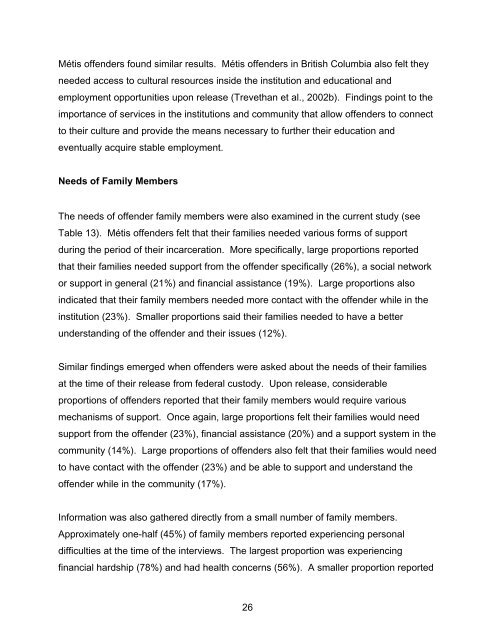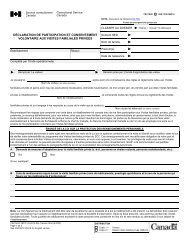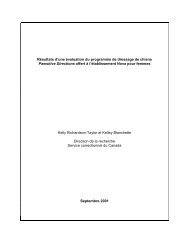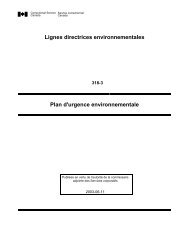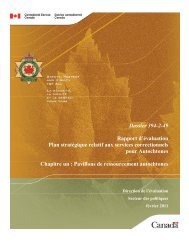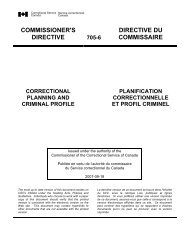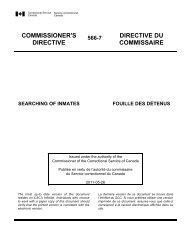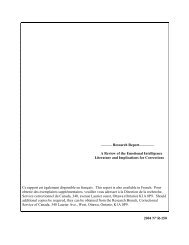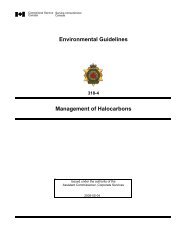Program and Service Needs of Federally Incarcerated Métis ...
Program and Service Needs of Federally Incarcerated Métis ...
Program and Service Needs of Federally Incarcerated Métis ...
You also want an ePaper? Increase the reach of your titles
YUMPU automatically turns print PDFs into web optimized ePapers that Google loves.
<strong>Métis</strong> <strong>of</strong>fenders found similar results. <strong>Métis</strong> <strong>of</strong>fenders in British Columbia also felt they<br />
needed access to cultural resources inside the institution <strong>and</strong> educational <strong>and</strong><br />
employment opportunities upon release (Trevethan et al., 2002b). Findings point to the<br />
importance <strong>of</strong> services in the institutions <strong>and</strong> community that allow <strong>of</strong>fenders to connect<br />
to their culture <strong>and</strong> provide the means necessary to further their education <strong>and</strong><br />
eventually acquire stable employment.<br />
<strong>Needs</strong> <strong>of</strong> Family Members<br />
The needs <strong>of</strong> <strong>of</strong>fender family members were also examined in the current study (see<br />
Table 13). <strong>Métis</strong> <strong>of</strong>fenders felt that their families needed various forms <strong>of</strong> support<br />
during the period <strong>of</strong> their incarceration. More specifically, large proportions reported<br />
that their families needed support from the <strong>of</strong>fender specifically (26%), a social network<br />
or support in general (21%) <strong>and</strong> financial assistance (19%). Large proportions also<br />
indicated that their family members needed more contact with the <strong>of</strong>fender while in the<br />
institution (23%). Smaller proportions said their families needed to have a better<br />
underst<strong>and</strong>ing <strong>of</strong> the <strong>of</strong>fender <strong>and</strong> their issues (12%).<br />
Similar findings emerged when <strong>of</strong>fenders were asked about the needs <strong>of</strong> their families<br />
at the time <strong>of</strong> their release from federal custody. Upon release, considerable<br />
proportions <strong>of</strong> <strong>of</strong>fenders reported that their family members would require various<br />
mechanisms <strong>of</strong> support. Once again, large proportions felt their families would need<br />
support from the <strong>of</strong>fender (23%), financial assistance (20%) <strong>and</strong> a support system in the<br />
community (14%). Large proportions <strong>of</strong> <strong>of</strong>fenders also felt that their families would need<br />
to have contact with the <strong>of</strong>fender (23%) <strong>and</strong> be able to support <strong>and</strong> underst<strong>and</strong> the<br />
<strong>of</strong>fender while in the community (17%).<br />
Information was also gathered directly from a small number <strong>of</strong> family members.<br />
Approximately one-half (45%) <strong>of</strong> family members reported experiencing personal<br />
difficulties at the time <strong>of</strong> the interviews. The largest proportion was experiencing<br />
financial hardship (78%) <strong>and</strong> had health concerns (56%). A smaller proportion reported<br />
26


